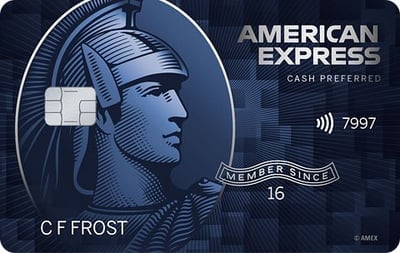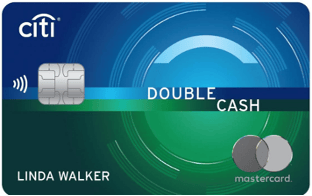Citi Double Cash vs. Blue Cash Preferred: Blue Cash Is Best for Savvy Shoppers
The Blue Cash Preferred has a high annual fee, but even taking that into account, it can still earn more cash back than the Citi Double Cash Card because of its elevated rewards rates on groceries, streaming, gas and more.

Many or all of the products on this page are from partners who compensate us when you click to or take an action on their website, but this does not influence our evaluations or ratings. Our opinions are our own.
If you like your credit card rewards in cash, and a lot of it, then the Citi Double Cash® Card and the Blue Cash Preferred® Card from American Express should be on your radar, and maybe in your wallet.
These cards offer some of the highest cash-back rates available, although they structure their rewards quite differently. The Citi Double Cash® Card is simple: you earn the same rewards rate on every purchase. In contrast, the Blue Cash Preferred offers tiered rewards, meaning you get a higher rate in certain categories.
Another major difference between these two credit cards: annual fees. The Blue Cash Preferred has one, and it’s pretty hefty, but the Citi Double Cash® Card doesn’t. Still, even with its sizable annual fee, the Blue Cash Preferred® Card from American Express is the better pick for most people because the high rewards rates make it fairly easy to recoup the annual fee — and then some.
Here’s how to decide between these two cash-back cards.
on American Express' website
on Citibank's application
Earn a $250 statement credit after you spend $3,000 in purchases on your new Card within the first 6 months. Terms Apply.
Earn $200 cash back after you spend $1,500 on purchases in the first 6 months of account opening. This bonus offer will be fulfilled as 20,000 ThankYou® Points, which can be redeemed for $200 cash back.
Earn 6% cash back at U.S. supermarkets on up to $6,000 per year in purchases (then 1%).
Earn 6% cash back on select U.S. streaming subscriptions.
Earn 3% cash back on transit including taxis/rideshare, parking, tolls, trains, buses and more.
Earn 3% cash back at U.S. gas stations.
Earn 1% cash back on other purchases.*
Terms apply.
Earn 2% cash back on purchases: 1% when you buy, plus 1% as you pay.
0% intro APR for 12 months on purchases and balance transfers, and then the ongoing APR of 19.49%-28.49% Variable APR .
0% intro APR on balance transfers for 18 months, and then the ongoing APR of 17.49%-27.49% Variable APR .
A Disney Bundle credit when you enroll and pay it with the card.
Terms apply.
Access to Citi Entertainment ticket portal.
Why the Blue Cash Preferred is better for most people
Prime rate on grocery spending
The signature feature of the Blue Cash Preferred® Card from American Express is the 6% cash back at U.S. supermarkets up to $6,000 a year in spending. For most people, this spending will be the deciding factor between these cards. If you hit the $6,000 cap, which many families will easily do, you’ll earn $360 in cash back from grocery expenses alone. In fact, you’d only need to spend about $1,583 a year at supermarkets to break even after accounting for the Blue Cash Preferred’s annual fee. Terms apply.
For big grocery spenders, the Citi Double Cash® Card simply can’t compete with the Blue Cash Preferred. Counting supermarket shopping alone, and taking into account the annual fee and the $6,000 rewards cap, you’d have to spend at least $1,710 a month ($20,520 a year) before the annual rewards on the Citi Double Cash® Card would surpass those on the Blue Cash Preferred.
Welcome offer
The Blue Cash Preferred® Card from American Express comes with a welcome offer that takes some of the sting out of the hefty annual fee: Earn a $250 statement credit after you spend $3,000 in purchases on your new Card within the first 6 months. Terms Apply.
The Citi Double Cash® Card has this sign-up bonus: Earn $200 cash back after you spend $1,500 on purchases in the first 6 months of account opening. This bonus offer will be fulfilled as 20,000 ThankYou® Points, which can be redeemed for $200 cash back.
Elevated rewards on everyday expenses
The Blue Cash Preferred® Card from American Express is mostly venerated for its 6% rewards rate at U.S. supermarkets, but in reality, it’s a very versatile card that offers big rewards on U.S. streaming services (6%), U.S. gas stations (3%) and transit (3%). Such a well-rounded reward structure makes the Blue Cash Preferred a solid pick for suburbanites who drive to work, city dwellers who use public transportation and anyone who has a streaming service or two.
Who might prefer the Citi Double Cash® Card
Minimal grocery spenders
If you don't spend much at supermarkets — maybe you’re single, or your family dines out more than they eat in — the Citi Double Cash® Card is the more prudent choice. Those who have smaller grocery budgets would have to spend a lot of money on gas, transit and streaming to make up for the Blue Cash Preferred’s annual fee — and make up the difference between that card and the Citi Double Cash® Card.
There's more to life than groceries, though. Clothing, dog grooming, traffic tickets, patio furniture — it all adds up. If the bulk of your expenses are incurred outside the supermarket aisle, the 2% everyday rewards rate on the Citi Double Cash® Card is clearly better than the 1% rate on the Blue Cash Preferred. The AmEx card's 3% rewards at U.S. gas stations and on transit could mitigate the damage a little — but remember, that annual fee still has to be paid whether you rack up big supermarket rewards or not.
Everyone's spending habits are different, of course. So we've made it easy to estimate the cash-back rewards you'd get on these cards. Enter your own estimated monthly spending into our rewards calculator:
Those who need to transfer a balance
If you're carrying high-interest debt and want to to save some money, the Citi Double Cash® Card offers more time to pay it off. New cardholders get a 0% intro APR on balance transfers for 18 months, and then the ongoing APR of 17.49%-27.49% Variable APR. The Blue Cash Preferred® Card from American Express has a 0% balance transfer period too, but it’s shorter than the one from Citi Double Cash® Card.
Citi allows balance transfers for credit card debt, personal loans, student loans, car loans and home equity loans. However, cardholders may not transfer a balance from existing Citi or Citi affiliate accounts. Note also that the intro APR period on the Citi Double Cash® Card applies only to transfers, not to purchases. This intro period on the AmEx card, by contrast, applies to both. If you choose to use the Citi Double Cash® Card as a balance transfer card and then make purchases on the card while carrying that transferred balance, you won't have a grace period and will incur interest on purchases from the time they post.
Minimalists
Earning cash back takes less “work” with the Citi Double Cash® Card than the Blue Cash Preferred® Card from American Express. You automatically earn 1% on all purchases and another 1% when you pay them off. The Blue Cash Preferred, with its five-tiered reward structure, is decidedly more complicated.
Some people would rather not sort through multiple cards at checkout in order to decide which one earns maximum cash back. If that sounds like you, the Citi Double Cash® Card will delight you with its simplicity.
Which card should you get?
If you're dead-set against paying an annual fee on a credit card, then your choice is easy. The Blue Cash Preferred® Card from American Express has one of the steepest annual fees of any consumer cash-back card while the Citi Double Cash® Card charges you precisely zip.
On the other hand, if you've got a family and you're spending, say, $700 a month at the supermarket, the Blue Cash Preferred is offering you a lot of free money for a space in your wallet, even after the annual fee.
At this point, you might be thinking: "If only I could get the high rewards rates on the AmEx card’s bonus categories and the Citi card's 2% rate on everything else." Well, uh, you can. Carry both cards, and use the Blue Cash Preferred at the supermarket, the gas station and when you're paying for streaming or transit. For everything else, put down the Citi Double Cash® Card. Plenty of people do just that.
Find the right credit card for you.
Whether you want to pay less interest or earn more rewards, the right card's out there. Just answer a few questions and we'll narrow the search for you.



